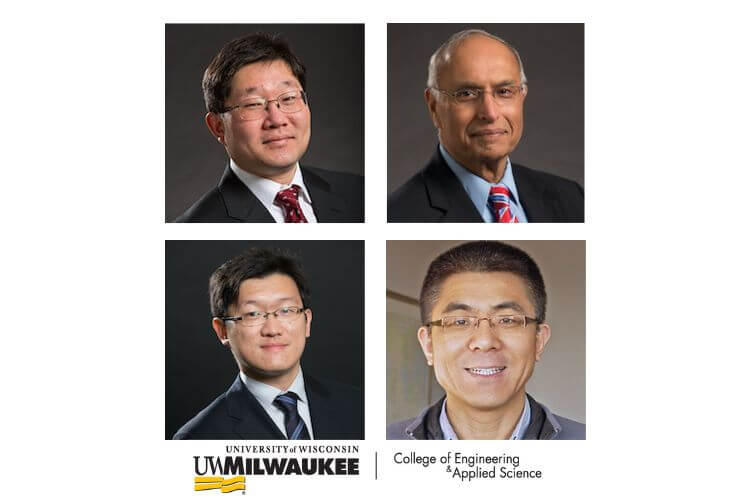The UWM Research Foundation in June recognized UWM inventors—including three at the College of Engineering & Applied Science—who in the last year were issued patents or whose technologies were licensed to an outside company or to the inventor through a startup company.
Woo Jin Chang, associate professor, mechanical engineering, was awarded the patent Contaminant Detection Device and Method. Patents were issued in five countries.
The Chang lab has collaborated with researchers at UW-Madison to create a novel heavy metal sensor. The project was initially funded by the Water Equipment and Policy (WEP) Research Center and is licensed by three of the center members non-exclusively. Chang formed the startup Septillionth, Inc. and is working with one of the licensees to create a working hand-held prototype for lead detection, which could be used both residentially or commercially in realms such as well drilling, tap water and wastewater treatment.
Pradeep Rohatgi, UWM distinguished professor, mechanical engineering, was presented with a technology license award for corrosion prevention.
Rohatgi and his team developed materials and methods of surface alloying using metal alloying powders and low-cost mild steel to prevent corrosion resistance. This work has been supported for many years by WEP members with over $250,000 in research funding. A U.S. patent has been filed and published, and the technology has been licensed by a national manufacturer.
Yin Wang, Lawrence E. Sivak ’71 associate professor, civil & environmental engineering, and Shangping Xu, associate professor, Department of Geosciences, were presented with a technology license award for adsorbent materials to remove PFAS.
Wang and Xu are developing a powdered adsorbent material to remove per- and polyfluoroalkyl substances (PFAS) from the environment. PFAS have been banned by the EPA, but the man-made chemicals—once ubiquitous in everyday items such as food packaging—continue to pose harm to the health of humans and the environment. Known as the “forever chemicals,” PFAS have emerged in soil and aquatic systems and are extremely hard to destroy.
The technology was supported by WEP and licensed by a national manufacturer.
To date, 137 patents have been issued with the UWMRF and 79 patent applications are pending. The UWMRF has 51 active license or option agreements.
